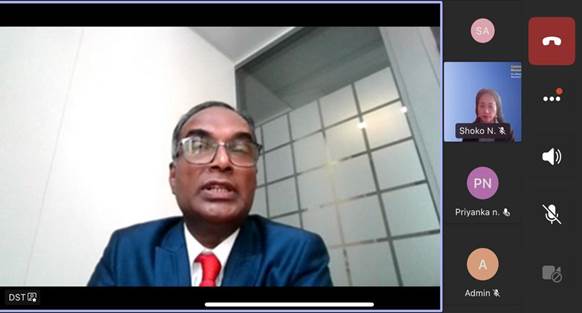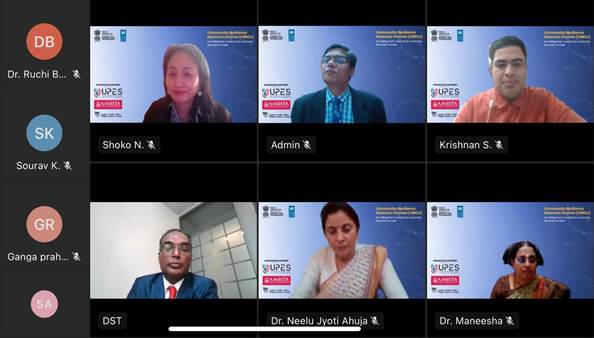Ministry of Science & Technology
Side event discusses roadmap of international partnerships for sustainable future through Community Resilience Resource Centres
Posted On:
05 MAY 2023 6:26PM by PIB Delhi
Secretary, Department of Science and Technology (DST) highlighted the importance of developing a mechanism of sharing knowledge, science, and technology between countries to create a sustainable, resilient society at a United Nation’s Global STI Forum 2023 Side Event on Community Resilience Resource Centers (CRRCs) For Aiding Post Covid Socio-Economic Recovery in India.
Insisting on knowledge sharing of hydrogen-based energy, new sustainable energy systems as well as ways to address food security issues, Dr. Chandrasekhar emphasised on a holistic approach in which AIs and other new technologies can be used to develop a resilient planet by addressing new and emerging challenges like changing climate, GHGs, pandemics, and other unknown diseases at the side event organized jointly by DST and the United Nation’s Development Programme (UNDP).

“We are all living in a world of uncertainty. Mankind has faced diseases, wars, events of climate change, and disasters. The Covid-19 pandemic had reversed the economic and human development in almost every country and is continuously spinning off several variants. Increasing poverty, food security, forced displacement, geopolitics, and compounding inequalities, has for the first time, resulted in the dropping of Global Human Development Index for 2 years in a row. This had taken the world back to the time just after the adoption of the 2030 Agenda for Sustainable Development and the Paris Agreement,” DST Secretary added.
Dr Chandrasekhar pointed out that uncertainties are not new to humankind, and many societies have embraced these unsettling realities and found clever ways to adopt and thrive. “Resilience isn’t just about hard infrastructure and building codes – it has a strong social and community component as well, and resilient communities empower their members to absorb and adapt to uncertainties, he stressed.
“Science, Technology, and Innovation play a critical role in building such community resilience. Diverse fields of science generate new knowledge that improves understanding of the processes for bringing community resilience. New market-ready technologies create innovative opportunities for increasing economic, social, and environmental resilience, and innovation can bring together non-traditional actors to unite their efforts and pool their resources towards community resilience,” Secretary DST elaborated.
He underlined that during the peak of the COVID pandemic, DST had started an initiative to establish Community Resilience Resource Centres (CRRCs) for building Science Technology and Innovation (STI) capacities of the communities for improved resilience against the pandemic and post-pandemic socio-economic recovery. “The focus is on integrating community resilience with sustainable livelihoods,” Dr. Chandrasekhar explained at the side event.

“The Community Resilience Resource Centres will help implement projects focused on livelihoods with S&T interventions and suitable skills so that the communities can make choices and manage uncertainty for a sustainable future. They will facilitate bilateral and multilateral partnerships that help promote various types of effective and inclusive science, technology, and innovation for resilient communities, share practical and advanced science, technology, and innovation-based community resilience models, experiences, best practices, and successful case studies through various forms of international collaboration and exchange activities,” said Ms. Shoko Noda, Resident Representative, UNDP India at the side event organized by DST and UNDP jointly.
While Dr. Debapriya Dutta, Head SEED Division, DST, dwelled on ways in which DST and UNDP could work on the CRRCs in the future, Dr. Konga Gopikrishna, scientist, DST, elaborated on the Concept of Community Resilience Resource Centers (CRRC). Dr. Maneesha Sudhir of Amrita Vidyapeetham, India, Dr. Neelu Ahuja, University of Petroleum and Energy Studies (UPES), India, and Dr. Ruchi Badola, Wildlife Institute of India shared their experiences of CRRCS.
The day-long side event deliberated on preparations for a blueprint for future cooperation between India and the world that can enable community-based technological solutions and frugal innovations for local resilience building and advance collaborative global research platforms for the development of scientific tools that contribute to such resilience.
<><><><>
SNC/PK
(Release ID: 1922173)
Visitor Counter : 1554